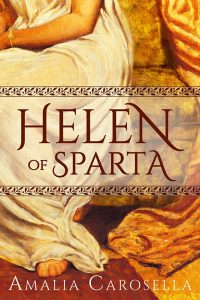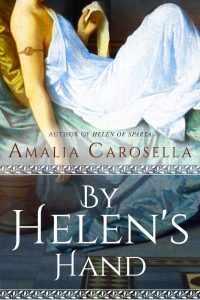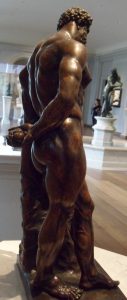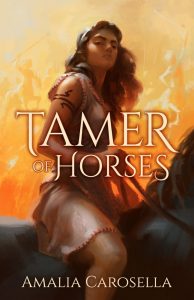 My guest today is fellow ancient history lover and author, Amalia Carosella. She is the author of Bronze Age Greek and Viking Age historical fiction, including Tamer of Horses, Helen of Sparta, and Daughter of a Thousand Years. As Amalia Dillin she also writes mythic fantasy and time-hop fantasy romance, including the ongoing Orc Saga and the completed Fate of the Gods trilogy. Once upon a time, she dreamed of being a zookeeper, but she’s settled for a house cat and a husband instead.
My guest today is fellow ancient history lover and author, Amalia Carosella. She is the author of Bronze Age Greek and Viking Age historical fiction, including Tamer of Horses, Helen of Sparta, and Daughter of a Thousand Years. As Amalia Dillin she also writes mythic fantasy and time-hop fantasy romance, including the ongoing Orc Saga and the completed Fate of the Gods trilogy. Once upon a time, she dreamed of being a zookeeper, but she’s settled for a house cat and a husband instead.
You can connect with Amalia via Twitter, Facebook, Patreon and her website. You can find her Tamer of Horses on Amazon and a link to all her books here.
What or who inspired you to first write? Which authors have influenced you?
 When I was a little girl my oldest brother was my hero. We’d spend hours creating elaborate stories and acting them out with his star wars action figures, and later my own. When he went to college (I was maybe in first grade), he studied creative writing, and of course then that was what I wanted to do, too! He also inspired my love of myth, particularly Greco-Roman myth, so we can go ahead and blame him for everything.
When I was a little girl my oldest brother was my hero. We’d spend hours creating elaborate stories and acting them out with his star wars action figures, and later my own. When he went to college (I was maybe in first grade), he studied creative writing, and of course then that was what I wanted to do, too! He also inspired my love of myth, particularly Greco-Roman myth, so we can go ahead and blame him for everything.
Beyond my brother, my biggest author influences are probably Anne McCaffrey and Lois McMaster Bujold. Every time I reread one of my favorite McCaffrey novels, I see stylistic elements that I picked up reflected back at me.
What is the inspiration for your current book? Is there a particular theme you wished to explore?
Tamer of Horses was inspired by Pirithous, who I LOVED writing as a secondary character in Helen of Sparta and unexpectedly became a fan favorite, too, and a line I found while researching him relating to Hippodamia—one of the writers said that Pirithous invited the centaurs to his wedding because they were kin to his wife, and I thought to myself, What does that Mean?! What would it LOOK like? And then I was off and running. In some ways it’s an exploration of kinship and how those bonds can be severed or broken by the people we love who refuse to let us grow, no matter how hard we try to hang on.
I’m also currently working on the final edits of a 1920s American historical fantasy novella Enduring Fate (part of my Fate of the Gods series as Amalia Dillin), which at its heart is about struggling with faith: how do you stay true to what you know on a soul deep level when everyone around you thinks you’ve lost your mind? (It’s also about the terrible treatment of women in mental wards during that period, and the horror of eugenics, too, which I think we often overlook in American history. As if we can just sweep it under the rug and pretend we had nothing to do with eugenics at all when we basically birthed it.)
What period of history particularly inspires or interests you? Why?
I LOVE the Greek Bronze Age. There’s so much room to explore and engage—we know just enough to inspire the imagination, and not so much that we have to worry about double checking if it rained on such and such a date. And I love being able to bring those people of the very distant past back to life, showing the world that they were still just people, like us. But even more, I’m extremely committed to writing historical fiction in this period that embraces the divine and the spiritual experiences relayed by the myths—many people who call what I write fantasy, but to me, it’s a true reflection of faith. This is what the Greeks believed in, how they remembered their history, and it isn’t my place to take that away.
What resources do you use to research your book? How long did it take to finish the novel?
For my Bronze Age titles, including my current work-in-progress: Homer, Pseudo-Apollodorus, Hesiod, Robert Graves, Bulfinch—Theoi.com is a phenomenal resource which does a lot of the work of collecting the attestations from all those sources and then some in one place when dealing with the gods themselves and bigger mythic figures. Also, M.I. Finley’s The World of Odysseus and the new research of Dr. Dimitri Nakassis influenced my interpretation and vision of the Bronze Age. I’m a little bit more fast and loose with my fantasy as Amalia Dillin, but I always try to look at translations of primary sources whenever possible. To read every variation/take on a mythic character that I can get my hands on before and after I dive in. Finding the heart of those figures and characters is one of the most critical elements for me, whether I’m writing historical fiction or fantasy.
 Tamer of Horses was originally, I thought, a novella. The first half I wrote fairly quickly (maybe a month or so?) as a result, thinking I might answer a call for novellas set in the ancient world with it (and that I did not want to write another tragedy) but after I’d finished, I realized—there is more to this story, it isn’t complete. So I kept going and wrote the war with the centaurs, as well. I don’t remember how long it took me altogether, several months maybe, for the second half of the book. but I definitely wrote it between Helen of Sparta and By Helen’s Hand. (Which was why I was so delighted to be able to include Polypoetes in By Helen’s Hand!)
Tamer of Horses was originally, I thought, a novella. The first half I wrote fairly quickly (maybe a month or so?) as a result, thinking I might answer a call for novellas set in the ancient world with it (and that I did not want to write another tragedy) but after I’d finished, I realized—there is more to this story, it isn’t complete. So I kept going and wrote the war with the centaurs, as well. I don’t remember how long it took me altogether, several months maybe, for the second half of the book. but I definitely wrote it between Helen of Sparta and By Helen’s Hand. (Which was why I was so delighted to be able to include Polypoetes in By Helen’s Hand!)
I can write pretty fast when I need to, blast out a draft in three to five months if I am really pressed, but in contrast, one of my Amalia Dillin novels, From Asgard, With Love took me seven years to finish. I wrote most of Enduring Fate during National Novel Writing Month in 2010, and then left it to sit until just this year, when I finally pulled it back out again to finish it. I’ve written just shy of 160,000 words so far this year across at least seven different projects, because when left to my own devices and not under contract I like to just work on whatever strikes my fancy on any given morning until something really grabs hold. That was the lesson I learned from burning out! Not to force myself to grind if I didn’t have to!
What do you do if stuck for a word or a phrase?
I go to twitter or facebook or El Husband and say “What’s that word that means…” and then by the time I’ve phrased the question, and told them it starts with what turns out to ALWAYS be the WRONG letter (?!?!?! what is wrong with my brain?!), it’s usually come to me. Worst case, I look up the synonyms on thesaurus.com until I find the one I’m looking for!
Is there anything unusual or even quirky that you would like to share about your writing?
I don’t talk like I write. I am a terrible speaker, honestly. My cousins tease me for it all the time—that I can’t form a coherent sentence in person (exaggeration!) but somehow I write novels. And when I’m deep in draft mode, you really, really cannot rely on me to remember anything that’s said to me while I’m looking at my word doc. In fact, you can’t rely on me to remember much of anything beyond the next sentence or the next paragraph or the next scene. Was I supposed to empty the dishwasher? Oops! I swear, Writer Brain is a thing!!
Do you use a program like Scrivener to create your novel? Do you ever write in long hand?
I write in long hand when I’m out running errands mid-draft and the next sentences keep coming. I don’t generally LIKE to do it because I HATE transcribing those words into my word document later and that slows me down after the fact—I use Word 2007, with One Note for random associated notes and images. But I heard they finally fixed the closed-quotation mark following an em-dash issue I’ve been wrestling with my entire adult life in the latest version of Word and it’s ALMOST temptation enough to upgrade. Almost.
Is there a particular photo or piece of art that strikes a chord with you? Why?
 I love William-Adolphe Bouguereau’s painting Idyll, in particular. It’s an image of a goatherd and his wife, baby bouncing on the goatherd’s knee. I don’t know what it is about it, but it’s so beautiful, and I kind of imagine that it is Paris and Oenone, I guess, in that peaceful period before he leaves Mount Ida and discovers he’s a prince of Troy. I also love Pierre August Cot’s Spring and The Storm. And I am a SUCKER for classical and neo classical sculpture. Especially Farnese Hercules! Those apples behind his back!! The casual pose!! Perfection.
I love William-Adolphe Bouguereau’s painting Idyll, in particular. It’s an image of a goatherd and his wife, baby bouncing on the goatherd’s knee. I don’t know what it is about it, but it’s so beautiful, and I kind of imagine that it is Paris and Oenone, I guess, in that peaceful period before he leaves Mount Ida and discovers he’s a prince of Troy. I also love Pierre August Cot’s Spring and The Storm. And I am a SUCKER for classical and neo classical sculpture. Especially Farnese Hercules! Those apples behind his back!! The casual pose!! Perfection.
What advice would you give an aspiring author?
It’s okay to not write. That’s as much a part of the process as the actual words on the page and we should not feel guilty about it. Build in time for not-writing. For downtime. You need to make that part of your habit because while discipline is important, so is taking care of yourself. Burn out is not a thing you want to have to struggle to come back from, and it is so, so easy to fall into it—by the time you’re wondering if you might be burning out, it’s probably too late to stop it and the road to recovery is long.
Tell us about your next book.
I’m in the middle of about a half-dozen different books and novellas, including a Paris of Troy epilogue to my Helen of Sparta duology, but my next big project as Amalia Carosella is a Heracles novel—I’ve been dying to write his book for years now, and I finally cracked how to approach it. Thematically, I think it’s going to focus on how our myths and our gods evolve alongside us. As we grow in our understanding of the world, we’re able to see the divine more clearly, but I think that the divine, too, must change and grow and see US more clearly, as well. It’s strange to think of it as limited in any way. As being static. And it isn’t true to my experience as a pagan, which influences how I see the faith traditions of the past and I think gives me a little bit of a different perspective on myth across the board. I’m about 20K words into it now and just falling more in love with every chapter. Fingers crossed it finds a home.

Abandoned as a baby, Hippodamia would have died of exposure on the mountain had it not been for Centaurus. The king of the centaurs saved her, raised her as his own, and in exchange asks for only one thing: she must marry the future king of the Lapiths, Pirithous, son of Zeus, and forge a lasting peace between their peoples by giving him an heir. It would be a fine match if Pirithous weren’t more pirate than king and insufferably conceited, besides. But Hippodamia can hardly refuse to marry him without betraying every hope her people have for peace.
After the death of Dia, queen of the Lapiths, tensions are running high. The oaths and promises protecting the Lapith people from the Myrmidons have lapsed, and the last thing Pirithous needs is to begin his kingship by making new enemies. But not everyone wants peace on the mountain. There are those among the centaurs who feel it comes at too high a price, and Peleus, King of the Myrmidons, lusts for the lush valley of the Lapiths and the horses that graze within it. Pirithous needs a strong queen at his side, and Hippodamia will certainly be that—if he can win her loyalties.
But no matter their differences, neither Hippodamia nor Pirithous expected their wedding banquet to be the first battle in a war.
Thanks Amalia – so many ideas bubbling inside your brain. Keep on writing such wonderful ancient world fiction.



Love the legend as the plot for this book…look forward to reading “Tamer of Horses” as I really enjoyed her earlier books about Helen.
Would love this book.
Great interview. Love the cover too.
Thanks so much for having me!! It was a pleasure!!
And for those interested, TAMER OF HORSES is just 99 cents this week on Amazon!
Thanks for sharing your sources of inspiration, Amalia – we have so much in common!
Although I’m an avid reader of Greek myths, I admit to knowing very little about the Centaurs at war. But this is a must read, especially for this retired equestrian journalist.
enjoyed the interview and can’t wait to read Tamer of Horses
Interesting premise. Great interview. Can’t wait to read it.
I enjoyed the interview, would love to read the book.
Great interview and the book sounds really great.